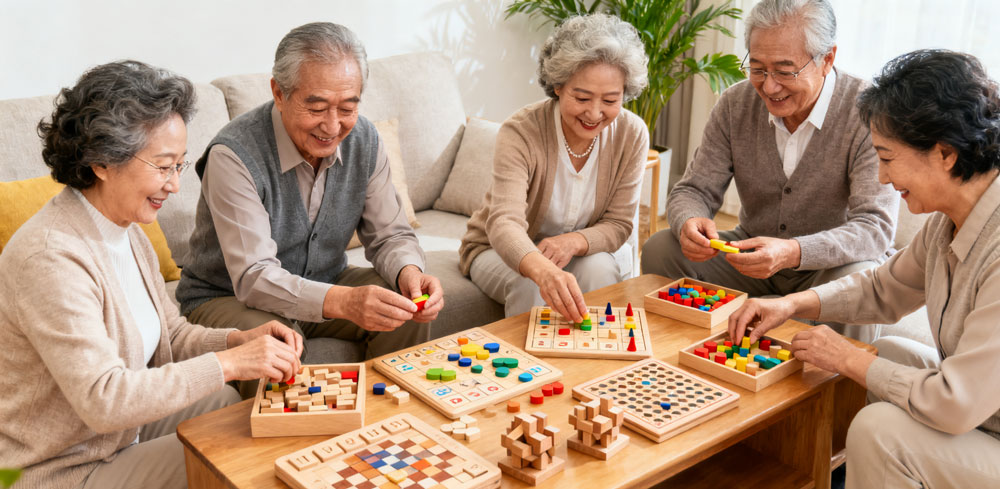From children's playrooms to senior care centers, wooden toys are being reimagined to support cognitive health, emotional wellbeing, and meaningful engagement for older adults.
The global toy industry is witnessing a remarkable shift as wooden toys—long associated with childhood development—are finding unexpected application in the rapidly expanding "silver economy." With populations aging worldwide, toys are being reengineered as cognitive maintenance tools and emotional wellness aids for seniors, creating a promising new market segment for forward-thinking manufacturers and retailers.

The Unignorable Demographic Shift
Countries worldwide are experiencing unprecedented aging trends. By 2030, 1 in 6 people globally will be aged 60 or older, with this demographic projected to reach 2.1 billion by 2050. This shift creates substantial demand for products supporting healthy aging—particularly those addressing cognitive health, which represents a primary concern for seniors and caregivers alike.
Research indicates that regular mental stimulation can help maintain cognitive function and potentially delay the onset of age-related conditions. Wooden toys, with their tactile nature, nostalgic appeal, and adaptability, present an ideal platform for creating engaging cognitive tools that feel less clinical and more enjoyable than traditional therapeutic devices.
Why Wooden Toys Are Ideal for Senior Users
Several inherent qualities make wooden toys particularly suitable for older adults:
- Sensory Appeal: The natural texture and warmth of wood provide comforting tactile stimulation, which can be especially beneficial for those with sensory impairment or dementia.
- Durability and Safety: High-quality wooden toys offer longevity and are typically free from electronic components that might confuse or intimidate some seniors.
- Nostalgic Connection: Traditional wooden designs often evoke positive memories from childhood, reducing resistance to engagement.
- Adaptable Challenge Level: Many wooden puzzles and games can be modified to accommodate varying cognitive abilities.
Emerging Product Categories in Senior-Focused Wooden Toys
Innovative companies are developing specialized wooden products targeting distinct needs within the senior market:
Cognitive Maintenance Puzzles
Advanced versions of traditional puzzles featuring:
- Larger pieces designed for arthritic hands
- Contrasting colors to support diminished vision
- Progressive difficulty levels to accommodate different cognitive stages
- Themes relevant to senior interests (nature, historical events, music)
Intergenerational Play Sets
Products designed to facilitate meaningful connections between seniors and younger family members, addressing social isolation while providing cognitive stimulation. These include:
- Cooperative building sets without competitive pressure
- Storytelling kits with generational themes
- Simple games with adjustable rules
Therapy-Supported Tools
Products developed in consultation with occupational therapists featuring:
- Sensory elements to calm anxiety
- Motor skill development components
- Memory recall prompts integrated into game mechanics
Market Opportunities and Implementation Strategies
The senior toy market represents a largely untapped opportunity with multiple entry points:
For Senior Care Facilities
Wooden toys offer activities that are:
- Cost-effective compared to electronic alternatives
- Easy to sanitize and maintain
- Suitable for group activities or individual use
- Capable of providing measurable cognitive engagement metrics
For Direct-to-Consumer Sales
Successful marketing approaches include:
- Emphasizing dignity and avoiding infantilizing language
- Highlighting research connecting cognitive engagement with wellbeing
- Offering subscription models for progressive challenge delivery
- Providing guidance on appropriate product selection based on cognitive ability
For Retailers
Key considerations for stocking senior-focused toys:
- Create dedicated sections that feel distinct from children's toys
- Train staff to understand the therapeutic benefits of products
- Develop partnerships with senior organizations and healthcare providers
- Highlight products during relevant awareness periods (Alzheimer's Month, etc.)
Success Stories: Early Adopters Seeing Results
Several forward-thinking companies have already established footholds in this emerging market:
- A German toy manufacturer reported a 300% increase in sales of their adapted memory games after marketing them to senior communities.
- A Japanese company developed wooden puzzle boxes that became popular in dementia care programs for their ability to stimulate problem-solving without causing frustration.
- Scandinavian designers have created beautiful wooden sorting games that double as decorative items, overcoming the stigma sometimes associated with therapeutic products.
The Path Forward
The convergence of demographic trends, wellness awareness, and product innovation creates a perfect opportunity for wooden toy manufacturers to expand into the silver economy. Success in this market requires:
- Collaboration with gerontology experts to ensure product efficacy
- Thoughtful design that respects the dignity of older users
- Educational marketing that helps caregivers understand product benefits
- Ongoing innovation to address varying needs within the senior population
As one industry insider noted, "The same qualities that make wooden toys beneficial for childhood development—sensory engagement, skill-building, and joy—make them equally valuable for supporting cognitive health in later years. This isn't just a new market; it's a meaningful application of our expertise."
Post time: Sep-29-2025



